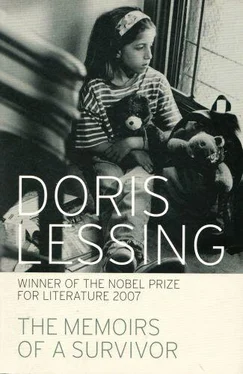In a moment, boxes, bundles and cases were filing into my living-room, the children beneath them. When the floor was covered with what had been taken, the children began to edge out again, looking at Emily but never at me: I might as well have been invisible.
'And now say you're sorry,' she ordered.
They smiled, the feeble awkward smile that goes with: Oh how she does go on! They were obeying Emily, but she was found overbearing: those embarrassed, affectionate smiles were not the first she had wrung out of them, I could see. I became even more curious about her role in that other house.
'No, come on,' said Emily. 'It's the least you can do.'
June's thin shoulders shrugged, and she said: 'We are sorry. But we have brought them back, haven't we?' My attempt to transcribe this is: 'Aow, w'srry, 't wiv brung'm beck, ivnt wee?'
In this effort of speech was the energy of frustration: this child, like others formed by our old time which above all had been verbal, to do with words, the exchange of them, the use of them, had been excluded from all that richness. We (meaning the educated) had never found a way of sharing that plenty with the lower reaches of our society. Even in two women standing on a street's edge bartering their few sentences of gossip had been the explosive effort of frustration: the deprived, thinned speech of the poor had always had somewhere in it the energy of a resentment (unconscious perhaps, but there) fed by the knowledge of skills and ease just beyond them, and whose place in their talk was taken by the constant repetition of the phrases — like crutches — 'you know?' and 'you know what I mean?' and 'isn't it?' and all the rest, phrases which made up a good part of everything they said. Words in their mouths — now in June's — had a labouring effortful quality — dreadful, because of the fluencies so easily available, but to others.
The children went off at last, June lingering behind. From her look around the room I could see she did not want to go. She was regretting, not the act, but the consequences of it, which might sever her from her beloved Emily.
'What was that about?' I asked.
Emily's bossiness dropped from her, and she slumped, a worried and tired child, near Hugo. He licked her cheek.
'Well, they fancied some of your things, that's all.'
'Yes, but…' My feeling was, But I'm a friend and they shouldn't have picked on me! Emily caught this, and with her dry little smile she said: 'June had been here, she knew the lay-out, so when the kids were wondering what place to do next, she suggested yours.'
'Makes sense, I suppose.'
'Yes,' she insisted, raising serious eyes to me, so that I shouldn't make light of her emphasis. 'Yes, it does make sense.'
'You mean, I shouldn't think there was anything personal in it?'
Again the smile, pathetic because of its knowingness, its precocity — but what an old-fashioned word that was, depending for its force on certain standards.
'Oh no, it was personal… a compliment if you like!'
She put her face into Hugo's yellow fur and laughed. I knew she needed to hide her face from the effort of presenting it all bright and eager, good and clever. Her two worlds, Gerald's place, my place, had overlapped in a threatening way. I could feel that in her, understand it. But there was an exhaustion in her, a strain that I did not understand — though I believed I had caught a glimpse of the reason in her relations with the children. Her problem was not so much that she was only one of the contenders for Gerald's favour, but that the burdens on her were much too heavy for someone her age?
I asked: 'Why did they bother with the electrical goods?'
'Because they were there,' she replied, over-short; and I knew she was disappointed in me. I had not understood the differences between them — a category in which she sometimes did and sometimes did not include herself — and me.
Now she was looking at me. Not without affection, I'm glad to say, but it was quizzical. She was wondering whether to attempt something with me — if it would be resented? would be understood?
She said: 'Have you been upstairs recently?'
'No, I suppose not. Should I have?'
'Well then — yes, yes, I think you should!' And as she made up her mind to go ahead with whatever it was she became whimsical, gay, a little girl charming or disarming a parent or adult; she cried out: 'But we must find something to put things on — yes, this will do. And of course if the lift isn't working — and most of the time it isn't these days, oh dear!'
In a moment she was flying about the rooms, gathering together every electrical object I had, except for the radio, with out which we were still convinced we could not live — the news from other countries might just as well be from other planets, so far away did they seem now; and in any case, things went on there just the same as they did with us. Mixers, the television, lamps — these I have already mentioned. To these were added a hair dryer, a massager, a grill, a toaster, a roaster, a coffee pot, a kettle, a vacuum cleaner. They were all piled together on a double-layered trolley.
'Come, come, come, come,' she cried gaily, gently, her serious eyes ever on me, for fear I might be taking offence, and out we went, pushing the over-loaded trolley. The hall was full of people: they streamed up and down the stairs, or waited for the lift — which was working; they laughed and talked and shouted. It was a crowd alight and a-glitter, restless, animated, fervent; everyone looked as if he or she had a fever. Now I realised that of course I had become used to seeing the hall and the pavement immediately outside the building full of this crowd, but I had not understood. This was because along the corridors of the lower floors of the building, all was as it had been: quietness, sobriety, and doors marked i, 2, 3, behind which lived Mr and Mrs Jones and family, Miss Foster and Miss Baxter, Mr and Mrs Smith and Miss Alicia Smith — little self-contained units, the old world.
We waited for our turn for the lift, pushed the loaded trolley into it, and went up with a crush of people who glanced at our goods and did not think much of them. On the top floor we pushed the trolley into the passage, and Emily stood for a moment, undecided: I could see it was not because she did not know her way, but because she was working out what would be best for me: precisely, what would be good for me!
Up here it was the same as on the ground floor: rooms all round the building with a corridor behind them; single rooms off that, a court in the middle — but here the court was of course a well, or gulf. There was a great bustle and movement up here, too. Doors stood open everywhere. It was like the approach to a street market, people with bundles of goods in their arms, or an old pram loaded with this or that, a man carefully holding a wrapped precious thing above his head so that no one could bump into it. It was hard to remember that in the lower parts of the building was quiet and the sense of people giving each other space. A room opposite the lift had a great mound of stuff, right up to the ceiling, and around it crouched children sorting things out into their categories. A child smiled up at Emily and explained: 'I'm just helping with this load, its just come in,' and Emily said: 'That's good, I'm glad,' reassuring the child. Again, there was in this exchange something which made me wonder: the little girl had been overready to explain herself. But we were in the entrance to another room, where an irregular gap in the wall, like bomb damage, communicated with the room we had left — the heap of things had hidden the gap. Through it were being taken by hand, or trundled on various kinds of little cart, certain categories of goods: this room was for containers — jars, bottles, cans and so on, and they were in every sort of material, from glass to cardboard. About a dozen children were at the work of carrying the containers from the heap next door through the gap, into this room: the one thing these markets were not short of, the one commodity no one had been short of for a long time, was labour, was hands to work at whatever was needed. In the corner stood two youths, on guard, with weapons: guns, knives, knuckle dusters. It was not until we stood outside the door of yet another room, where the atmosphere was altogether lower, and more listless, and where there was no guard, that I understood the contents of the rooms with the two armed boys were valuable, but that this room held stuff not valued at all: electrical goods like these we were pushing on our trolley.
Читать дальше
Конец ознакомительного отрывка
Купить книгу












